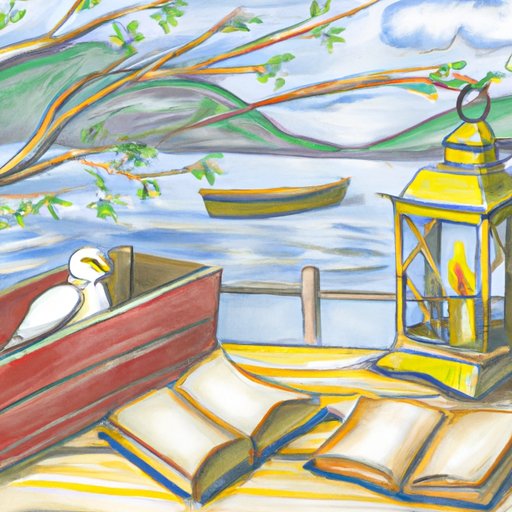I. Introduction
For centuries, readers across the world have been drawn to the captivating and enduring stories that make up Russian literature. From the emotional intensity of Tolstoy’s War and Peace to the psychological depth of Dostoevsky’s Crime and Punishment, Russian literature has a unique appeal that transcends time and place. This article seeks to examine what sets Russian literature apart from other forms of literature and explore its rich history and legacy. Through tracing its development and examining recurring themes, we can gain a deeper appreciation for the universality and appeal of Russian literature.
II. From Tolstoy to Dostoevsky: The Rich History and Legacy of Russian Literature
Russian literature has a long and notable history, dating back to the 10th century. Over the centuries, many notable authors and works have emerged, including Alexander Pushkin, Fyodor Dostoevsky, and Leo Tolstoy. One of the key characteristics of Russian literature is its emotional intensity, which is often paired with psychological depth. Authors delve deeply into the human psyche and explore complex emotions that resonate with readers across generations.
Perhaps the most well-known and beloved works of Russian literature are Tolstoy’s War and Peace and Anna Karenina and Dostoevsky’s Crime and Punishment and The Brothers Karamazov. These tales of love, tragedy, and human nature continue to captivate readers worldwide. But Russian literature is not only limited to these famous works, and there are many lesser-known authors and works that also showcase the richness of the genre.
III. Themes and Motifs in Russian Literature: What Makes It So Engrossing and Universally Relevant
Russian literature is known for its exploration of recurring themes and motifs that explore the human experience in unique ways. Love, death, and nature are some of the most common themes that permeate through many works. However, Russian authors approach these themes in a unique and often subversive way, delving into the complexities of human emotions and motivations.
One example of this is evident in Anton Chekhov’s play, The Seagull, which explores the complexities of human relationships, unrequited love, and the futility of artistic ambitions. Another example is Pushkin’s Eugene Onegin, which delves into themes of love, pain, and social constraints. The exploration of these themes in unique ways is just one of the many reasons why Russian literature is so engrossing and universally relevant.
IV. The Role of Russian Literature in Shaping the Global Literary Canon
Russian literature has had a significant impact on the development and shaping of the global literary canon. The works of Dostoevsky and Tolstoy, for example, have had a profound influence on the development of the realist tradition. Dostoevsky’s exploration of existential themes has also influenced the development of existentialism as a philosophical movement. The impact of Russian literature can also be seen in literary traditions beyond Russia, as many authors have been influenced by Russian writers and have incorporated their works into their own writing styles.
Moreover, many authors also see Russian literature as a challenge to current literary conventions. The works of Chekhov, for example, are often regarded as revolutionary as they broke away from traditional storytelling structures and focused on creating realistic characterizations while exploring deeper psychological themes.
V. Why We Should All Read More Russian Literature: The Benefits and Joys of Exploring New and Different Literary Traditions
There are many benefits and joys to exploring new and different literary traditions such as Russian literature. Reading outside of one’s own cultural background can broaden understanding and empathy towards other cultures. Russian literature, in particular, is an excellent choice for those seeking a different literary experience that still tackles universal themes and emotions.
Moreover, Russian literature also has played an important role in shaping not only Russian national identity but also global literature. The works of Pushkin, for example, played a significant role in creating a sense of national identity among Russians, while also influencing other literary traditions worldwide.
VI. The Future of Russian Literature: Emerging Authors and Exciting New Trends to Watch
While Russian literature has a rich history, the genre is not confined to the past, and there are many exciting developments and emerging authors in contemporary Russian literature. Olga Tokarczuk’s recent Nobel Prize win is a testament to the continuing relevance and impact of Russian literature in the contemporary literary world. Additionally, many contemporary Russian authors are breaking new ground within the genre, exploring new themes and breaking away from traditional narrative structures.
One exciting development in Russian literature is the emergence of feminist themes and perspectives. Contemporary authors such as Elena Chizhova and Alisa Ganieva are exploring the experiences of women in modern Russia and challenging traditional literary norms and conventions.
VII. Conclusion
Russian literature’s timeless stories and unique appeal will continue to captivate readers for generations to come. Through its exploration of universal themes such as love, death, and human nature, Russian literature offers an experience that resonates across cultures and time periods. Furthermore, its impact on shaping the global literary canon cannot be understated. As we look to the future, exciting developments and emerging authors in Russian literature offer a promising future for this enduring and captivating genre.
(Note: Is this article not meeting your expectations? Do you have knowledge or insights to share? Unlock new opportunities and expand your reach by joining our authors team. Click Registration to join us and share your expertise with our readers.)
